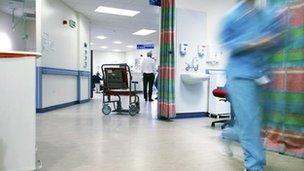NHS changes 'essential' for doctor training, says dean
- Published

Senior health officials stress they are open minded and no final decisions over changes have been taken
Doctors will be able to receive the specialist training they need if plans for a major NHS shake-up in south Wales go ahead, it is claimed.
Proposed changes include cutting specialist departments from seven to four or five.
Prof Derek Gallen, Wales' postgraduate dean for medical education, says focusing on specialist care in fewer large hospitals is essential for the Welsh NHS to attract the best doctors.
A consultation was launched last week.
Health officials said the "best fit" was to locate specialist services in Cardiff, Swansea, Merthyr, Bridgend and a new hospital near Cwmbran.
These units would be led by consultants around the clock and throughout the week.
The move could see the Royal Glamorgan Hospital in Llantrisant stop treating the most serious A&E cases.
"The Wales Deanery fully supports the South Wales Programme's work to reconfigure services - changing the way we provide some hospital services is essential to help us improve the training experience and to attract doctors to Wales," said Prof Gallen.
"We are in a downward spiral in terms of the recruitment and retention of trainee doctors in a number of specialties.
Prof Derek Gallen says concentrating specialist services will attract better staff
"This is a vitally important issue for the NHS because we get many of the doctors, consultants and GPs who work on the frontline from our training grades."
The Wales Deanery is the body responsible for the recruitment of foundation doctors, specialty and general and dental practitioner trainees throughout Wales.
Prof Gallen said recruitment in some areas, such as paediatrics, psychiatry and emergency medicine was a UK problem.
He added: "But the problem for Wales is that in those areas where there are UK difficulties, it's even worse for us because doctors don't want to come to work and train in small hospital units where they don't have as much support or protected education time.
Thinly spread
"Providing the same services in so many hospitals means that the medical rotas are spread very thinly across south Wales and the educational experience is not sufficient for the curriculum.
"This means we are not training the best doctors for the future of healthcare in Wales."
NHS leaders believe services are currently spread too thinly.
They have warned some specialist hospital services are "on the edge" and could "collapse" unless big changes are made to the way they are delivered.
The Royal Glamorgan also stands to lose consultant-led maternity care and specialist baby care as part of the proposals for the future of hospitals in south Wales.
Five health boards have been drawing up the proposals, which include hospitals from Swansea, Cardiff and Newport, since the start of 2012.
They argue the changes are essential to ensure hospital care meets UK-wide professional standards and to deal with issues such as a shortage of doctors, an ageing population and financial pressures.
The plans involve:
Consultant-led maternity care (obstetrics)
Specialist baby care (neonatal)
Specialist children's care (paediatrics)
Emergency medicine (A&E)
At the moment eight hospitals in the region provide one or more of these services.
The health boards have been evaluating since September whether concentrating all those services in four or five centres would be most suitable.
The centres would include the University Hospital of Wales (UHW) in Cardiff, Morriston Hospital near Swansea and a new hospital at Llanfrechfa Grange near Cwmbran.
This would incorporate some services from Nevill Hall hospital in Abergavenny and the Royal Gwent hospital in Newport.
A two month consultation will consider whether Prince Charles Hospital in Merthyr Tydfil, the Princess of Wales Hospital in Bridgend or the Royal Glamorgan Hospital would be the fourth or fifth centre.
But health officials said the option which is the "best fit" chooses the Bridgend and Merthyr Tydfil hospitals over the Royal Glamorgan.
The recommendation was based on criteria including travel times, the number of doctors needed, impact on ambulance services and cost.
Local Labour MPs and AMs - including Education Minister Leighton Andrews - have launched a campaign in support of the Royal Glamorgan.
- Published28 May 2013
- Published22 May 2013
- Published14 May 2013
- Published28 March 2013